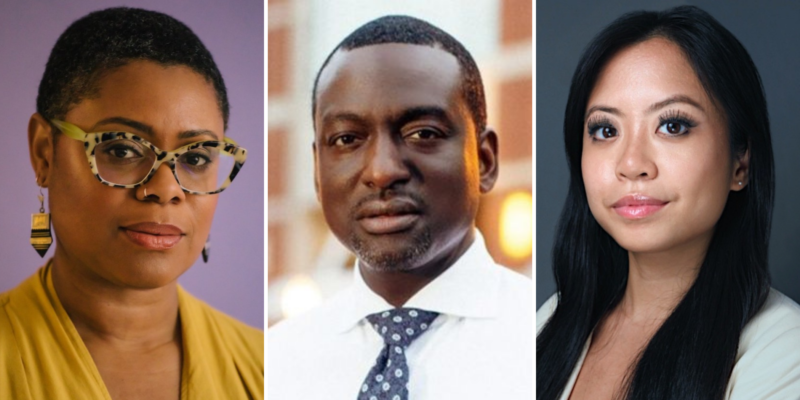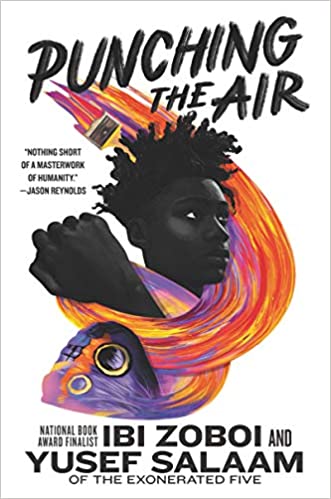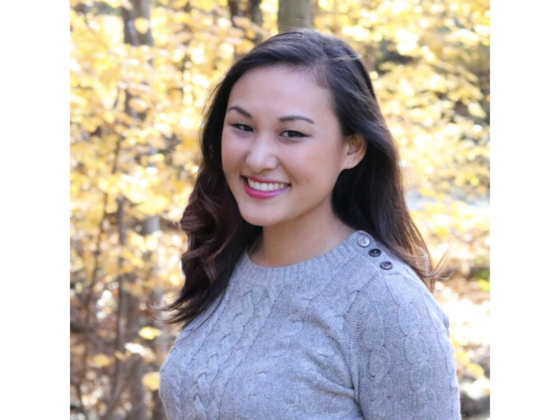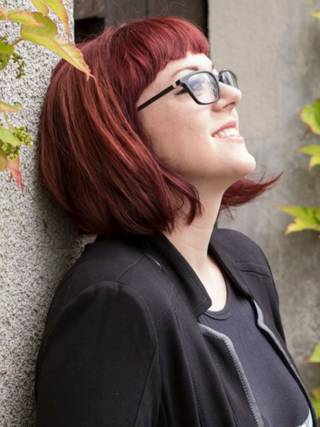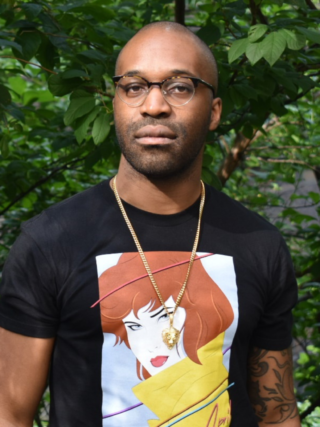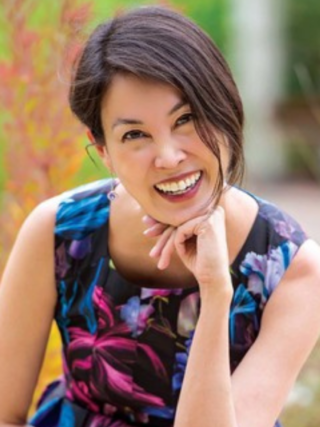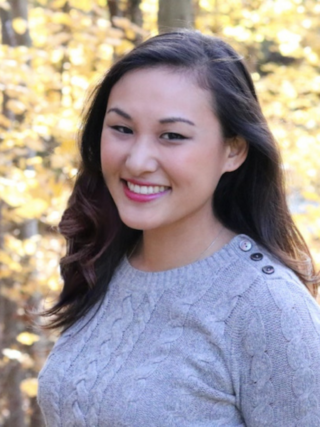In our special edition 88 Cups of Tea podcast episode, we released an episode featuring National Book Award Finalist Ibi Zoboi and Yusef Salaam of The Exonerated Five in conversation with 88 Cups of Tea guest-host and advocate Lelina Chang whose work is focused on the intersection of racial equity and environmental justice.
In 1989, Dr. Yusef Salaam was just fifteen years old when he was tried and convicted in the “Central Park Jogger Case” along with four other Black and Latino boys. The Exonerated Five spent between seven to 13 years behind bars, until their sentences were overturned in 2002. Since then, they received a multi-million-dollar settlement from the City of New York for its injustice and were profiled in award-winning films, including The Central Park Five documentary from Ken Burns, Sarah Burns, and David McMahon and the award-winning Netflix limited series When They See Us, written and directed by Ava DuVernay.
In our podcast episode, Lelina interviews Yusef and Ibi about their newest co-authored novel in verse Punching the Air and how the book came to fruition. Yusef talks about the power of self-purpose and hope and how his spiritual journey was mirrored through the main character Amal while Ibi shares how she embraced and holistically weaved Yusef‘s stories and philosophies to craft a story told from a young Muslim, Black boy’s point of view. Further in, they break down and analyze two influential poems in the novel that speak to Yusef’s experience being boxed in with his thoughts and his own devices in his jail cell, and the power DNA has to tie individuals to the collective injustices of the past. Ibi shares how crafting her poems in different shapes and forms helps bring to life the meaning of the poems on the page. And later, they discuss what it means to bring about diversity with diversity and the crucial work that still needs to be done to create a holistic representation of communities of color in the literary world.
Books and resources:
- The Central Park Five directed by Ken Burns, Sarah Burns, and David McMahon
- Time: The Kalief Browder Story directed by Jenner Furst
- 13TH directed by Ava DuVernay
- Author and Historian Dr. John Henrik Clarke
- Author Ibram X Kendi
- A Fine Bookshelf article by Ibi Zoboi
- Rappers KRS-One, Public Enemy, A Tribe Called Quest, and Kendrick Lamar
- Artists Jacob Lawrence and Jean-Michel Basquiat
- Motivational speaker and author Les Brown

Check out these highlights:
- We learn how co-authors Yusef Salaam and Ibi Zoboi came together to collaborate and bring to fruition their newly published novel in verse Punching The Air
- We unpack their writing process and discuss how Ibi interpreted Yusef’s experiences and philosophical thinking to translate them into accessible stories for a younger audience
- We discuss how Ibi crafted the emotional and spiritual journey of a young Muslim, Black boy who was wrongfully convicted
- Discover the main themes and messages Yusef aimed to portray throughout the novel
- We dissect the meaning of Yusef’s name and why they chose ‘Amal’ as the name for the main character in PUNCHING THE AIR
- We discuss how we can gain value and discover our sense of purpose in moments of stillness
- Learn how Ibi utilizes shapes and imagery to visually provide the meaning of the poems on the page
- We flesh out the power DNA has to tie individuals to the collective injustices of the past
- What does it mean to drive diversity with diversity by breaking down stereotypes and highlighting different narratives?
- We hear from Ibi about her journey to becoming an award-winning author and how she prevents burnout
“The thing that I wanted to convey, most importantly, was the sense of being born for a purpose. That you’re born on purpose; you’re not born by mistake. Even the most unpopular worst kinds of situations, the fact that you come out, you show up in the world, now you have to live this life, and if you show up and come out on purpose, then you have the opportunity to psychosocially say that you matter. And so, therefore, you begin to add as opposed to detract. You don’t move throughout your life as if you are a mistake.”
DR. YUSEF SALAAM
“The interesting thing was that hope also is put in prison. If you have the opportunity to be still and listen, you can get so much value from it. And I’m not talking about going there like, ‘Hey, let’s go to prison. Let’s go on a field trip.” No, I’m saying if you find yourself there, there’s something to be gotten. Don’t just go through the process of prison, right? You can either do time or let time be you. And most of the time, if you let time be you, you come out a monster. If you do time, then you can utilize time and still find sacredness and specialness in you. There’s value there.”
DR. YUSEF SALAAM
“I wanted to just show this idea of just being trapped in, and you’re left to your own devices, your own mental process, your own spiritual process while being boxed in. And the best way that I could convey that was through how the words are placed on the page.”
Ibi Zoboi
“DNA, this idea that we are linked, it’s something that could’ve linked him to the crime, but I flipped it and say he’s linked to all the injustices that came before him. And the last line is that what if we’re not supposed to break free from these chains?”
Ibi Zoboi
“How do you maintain faith in a world that is trying to take it from you?”
DR. YUSEF SALAAM
“The slow and steady brings out the stars.”
Ibi Zoboi
Learn more about Punching the Air
The story that I thought
was my life
didn’t start on the day
I was born
Amal Shahid has always been an artist and a poet. But even in a diverse art school, he’s seen as disruptive and unmotivated by a biased system. Then one fateful night, an altercation in a gentrifying neighborhood escalates into tragedy. “Boys just being boys” turns out to be true only when those boys are white.
The story that I think
will be my life
starts today
Suddenly, at just sixteen years old, Amal’s bright future is upended: he is convicted of a crime he didn’t commit and sent to prison. Despair and rage almost sink him until he turns to the refuge of his words, his art. This never should have been his story. But can he change it?
With spellbinding lyricism, award-winning author Ibi Zoboi and prison reform activist Yusef Salaam tell a moving and deeply profound story about how one boy is able to maintain his humanity and fight for the truth, in a system designed to strip him of both.
Learn more about Dr. Yusef Salaam
In 1989, Dr. Yusef Salaam was just fifteen years old when he was tried and convicted in the “Central Park Jogger Case” along with four other Black and Latino boys. The Exonerated Five spent between seven to 13 years behind bars, until their sentences were overturned in 2002. Since then, they received a multi-million-dollar settlement from the City of New York for its injustice and were profiled in award-winning films, including The Central Park Five documentary from Ken Burns, Sarah Burns, and David McMahon and the award-winning Netflix limited series When They See Us, written and directed by Ava DuVernay.
Over the past two decades, Yusef has become a family man, father, poet, activist, and inspirational speaker. He continues to share his story with others to educate the public about the impact of mass incarceration and police brutality. He regularly advocates for criminal justice reform, prison reform, and the abolition of juvenile solitary confinement and capital punishment. Yusef is the recipient of a Lifetime Achievement Award from President Barack Obama (2016), the Phoenix Award from the Congressional Black Caucus (2019), an honorary Doctorate of Humanities from Anointed by God Ministries Alliance & Seminary (2014), and a long list of Proclamations—most notably from New York State Senate (2018), and New York City Council (2013).
Learn more about Ibi Zoboi
Ibi Zoboi was born in Port-au-Prince, Haiti, and holds an MFA in writing for children and young adults from Vermont College of Fine Arts. Her writing has been published in the New York Times Book Review, the Horn Book magazine, and the Rumpus, among others. Her novel American Street was a National Book Award finalist, received five starred reviews, and was a New York Times Notable Book. She is also the author of Pride and My Life as an Ice Cream Sandwich, which was a New York Times bestseller, as well as being the editor of the anthology Black Enough. She lives in New Jersey with her husband and their three children. You can find her online at www.ibizoboi.net.
Learn more about Lelina Chang
Lelina Chang is a consultant and an advocate whose work is focused on the intersection of racial equity and environmental justice. Currently, she is a Consultant at Deloitte within the Government and Public Sector. With her special interest in critically examining and furthering the discussion on the intersection of racial equity and environmental sustainability, outside her client work, Lelina spearheaded a 3-month curriculum at Deloitte around Anti-Racism and Environmental Justice and facilitated over a dozen sessions locally in the Greater Washington Area as well as nationally, with more to come. These discussion groups aim to be intimate settings where practitioners can continue the momentum and dialogue around dismantling our country’s deeply unjust system–by reflecting on their own biases, teasing out thought-provoking concepts by Black authors/speakers, and supporting each other in being the change they want to see in their own social circles and communities. Her vision was not only to provide education around topics like police brutality, environmental racism, and microaggressions and its impact on marginalized communities, but more importantly, drive engagement, accountability, and action that last far longer than the news cycle.
Lelina received a BS in Molecular, Cellular, Developmental Biology and a BA in Sociology from Yale University where she conducted immunology research for four years and contributed to a scientific finding published in Nature, which is considered one of the two most impactful science journals globally. Lelina is passionate about the role youth play in solving some of society’s most complex issues, and during her time as a Yale undergrad, served as the former President of the Ivy Council, an organization connecting student leaders across the eight Ivy League campuses. She organized the Ivy Delegation to the World Summit of Nobel Peace Laureates and to the United Nations Youth Assembly, and served as the Executive Director of the Ivy Leadership Summit, which brought together 160+ students leaders across 10 universities to discuss how to actualize visions for global change within Education, Technology, Government & Activism, Global Health & Development, and General Entrepreneurship.

